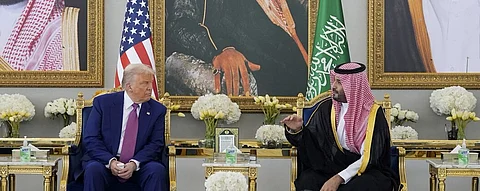

U.S. President Donald Trump signed a landmark $600 billion "strategic economic partnership" with Saudi Arabia on Tuesday, shortly after arriving in the Kingdom for a four-day visit to the Middle East.
In Riyadh, Trump met with Saudi Arabia’s de facto ruler, Crown Prince Mohammad bin Salman, to finalize the comprehensive agreement, which includes investments across sectors such as mining, artificial intelligence, energy, defense, and space technology.
As part of the broader package, the U.S. and Saudi Arabia also concluded a $142 billion arms deal. The weapons agreement includes the provision of mordern military equipment covering air force and space capabilities, air and missile defense systems, naval and coastal security, border security, ground forces modernization, and upgrades to information and communication systems.
The agreement also provides for enhanced training of Saudi forces, including the modernization of the Kingdom's military academies. The arms sale is expected to be fully executed by the fall.
In a notable development in the space sector, the White House announced that NASA and the Saudi Space Agency signed a deal for a Saudi CubeSat satellite to fly aboard NASA’s Artemis II test flight — marking a cooperative step in U.S.-Saudi space collaboration.
The agreements mark a major accomplishment for President Trump’s Middle East strategy, bolstering both economic ties and defense cooperation with one of Washington's key regional allies. Tuesday’s agreements underscore that Riyadh continues to view Washington as its primary partner in both economic development and defense cooperation.
In addition to his meetings in Riyadh today, Trump is scheduled to meet Syrian interim President Ahmed al-Sharra there tomorrow. According to reports, al-Sharra is expected to propose a “Ukraine-style” minerals agreement that would grant U.S. companies access to Syrian oil, gas, and other natural resources in exchange for sanctions relief.
Sources also suggest that normalization of Syria's relations with Israel — including potential entry into the Abraham Accords — may be among the conditions for any future agreement between Washington and Damascus.